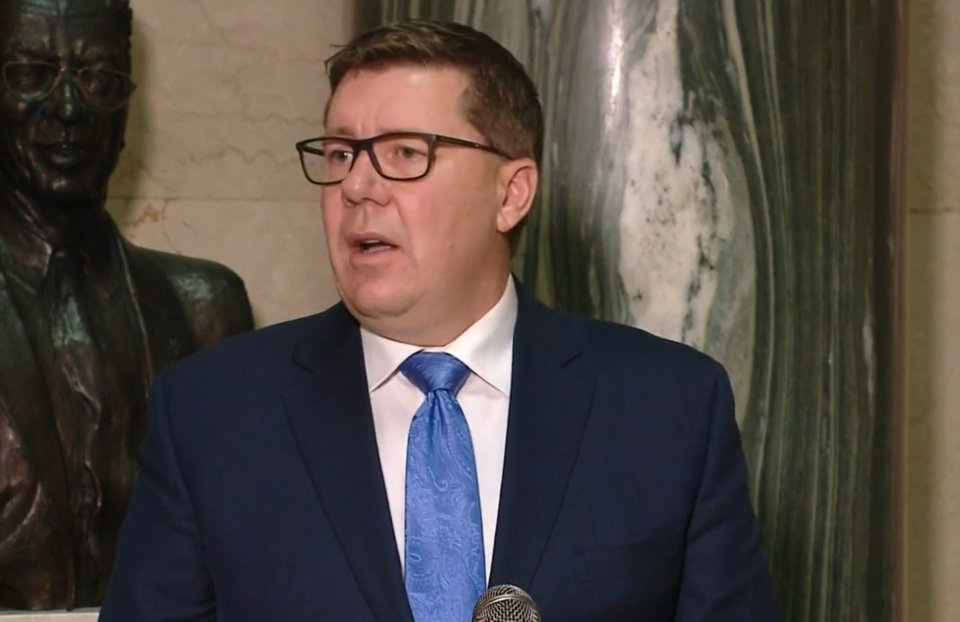REGINA — Saskatchewan has announced an expansion of availability to booster dose vaccines, in the hopes of preparing residents for the potential incoming wave of the Omicron variant of COVID-19.
Premier Scott Moe held a press conference on Dec. 16 to make the announcement and discuss the province’s plans to address the new variant.
“Our [case] numbers are in a very solid position here in Saskatchewan, but as we see what's happening and how quickly this new variant is moving across the world and other provinces in Canada, right now we should assume it's in our community and every case is Omicron,” said Moe.
“We are asking and urging Saskatchewan residents [to] conduct themselves in a cautious manner in the days ahead, and throughout the holiday season.”
Beginning on Dec. 20, booster dose availability will expand to include all residents over the age of 18 who received their second vaccine dose at least three months prior — a reduction from the previous interval requirement of five months.
The last expansion for booster shots was on Dec. 7 and reduced the age requirement to 50 and older. Moe said the drastic jump down to age 18 is in the interest of preparing for transmission of the Omicron variant.
“This is to get as many booster shots available to as many Saskatchewan residents as possible, in the advent of what we know most assuredly is going to be a significant wave of Omicron across Canada,” said Moe.
A total of five cases of the Omicron variant have already been reported in Saskatchewan, according to the province’s COVID-19 dashboard. Moe said those cases have all been identified as travel-related and were isolated, posing little risk to the community.
“The Omicron variant that we are becoming increasingly aware of is much more transmissible than any other variant we have faced, including the Delta variant,” said Moe. “Community spread is going to be the challenge in the weeks and months ahead.”
Moe said that third-dose vaccinations will be “the most effective thing we can do in preparing for Omicron.”
An estimated 400,000 vaccine doses are currently ready to be administered to residents in Saskatchewan, and the federal government has provided assurance that more will be made available.
Rapid tests are also in healthy supply, said the premier, with 8 million tests already distributed and 4 million tests being ordered monthly for Saskatchewan.
Moe encouraged residents to pick up the free rapid-test kits and utilize them regularly at home, to help keep tabs on transmission risk.
He also advised residents to take caution over the holidays when gathering and travelling, despite no formal public health measures to limit contact.
“We need to conduct ourselves in our communities with a fair degree of caution. That doesn’t mean we need to stay home,” said Moe. “But we should conduct ourselves with the pretense that Omicron is here and present.”
Canada issued federal warnings against all non-essential travel outside the country on Wednesday, citing concerns about the increasing presence of the Omicron variant abroad. Mandatory testing upon arrival is also now in place for all travellers coming from non-U.S. destinations, in addition to the test required upon departure.
Moe said that there are currently no provincially issued travel restrictions, but people are advised to “exercise caution” and adhere to rules when travelling both internationally and interprovincially in the coming weeks.
“I think at this point in time, it's incumbent on all of us to do what we can to slow and stop the spread to the greatest degree possible in our community,” said Moe.
The premier confirmed that there is currently no active discussion about bringing in further public health measures in the near future, but officials are always monitoring the situation.
“We’re always looking at the tools we have to address what we predict might lie before us,” said Moe. “We firmly believe that the robust protocols that we have in place for all Saskatchewan people are quite capably keeping Omicron that may come in through travel at bay.”
Mass drive through clinics are also not likely to be returning, as the health authority would need to slow services to create staff availability to do so, said Moe.
Saskatchewan residents are instead encouraged to book appointments with health authority clinics or utilize pharmacy availability in order to receive booster doses. Additional clinics may be added over the holidays, to increase accessibility, said Moe.
More details on COVID-19 vaccination and testing clinics is available at saskatchewan.ca/COVID19.




